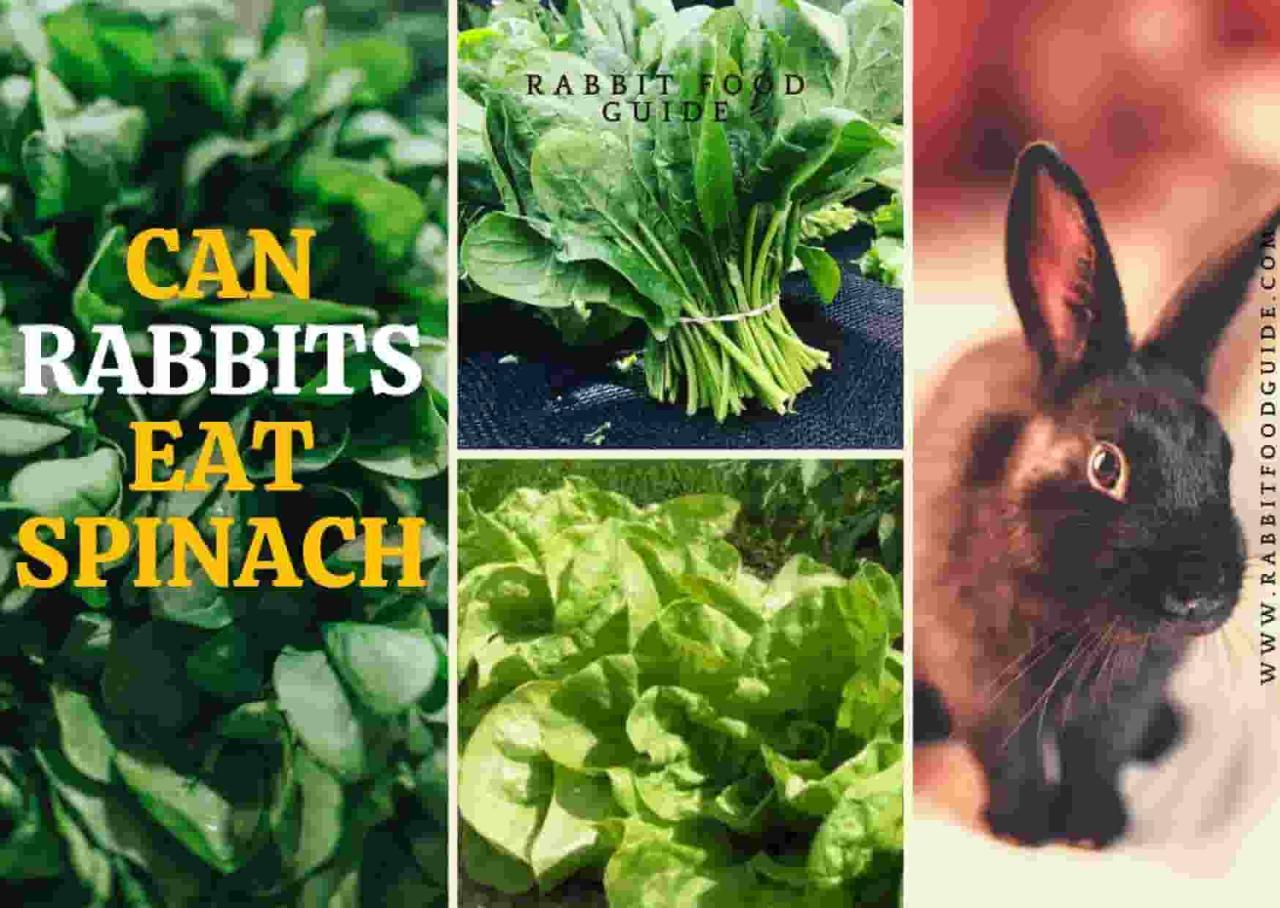Spinach is a nutritious leafy green that offers numerous health benefits for humans. But can rabbits enjoy this leafy delicacy as well? The answer is yes, but with some important considerations. This article delves into the nutritional value of spinach for rabbits, the potential risks associated with its consumption, and safe serving guidelines to ensure your furry friend enjoys the benefits without any adverse effects.
Rabbits are herbivores with unique dietary needs. Understanding the nutritional composition of spinach and its impact on rabbits’ health is crucial for responsible pet ownership. This article provides a comprehensive overview of the topic, empowering you to make informed decisions about feeding spinach to your rabbit.
Nutritional Value of Spinach for Rabbits
Spinach is a nutrient-rich leafy green that can provide several health benefits for rabbits. It is an excellent source of vitamins, minerals, and antioxidants that are essential for a healthy rabbit diet.Spinach is a good source of vitamin A, which is important for vision, skin health, and immune function.
It is also a good source of vitamin C, which is an antioxidant that helps protect cells from damage. Additionally, spinach is a good source of iron, which is important for red blood cell production.Incorporating spinach into a rabbit’s diet can provide several health benefits.
For example, the vitamin A in spinach can help to improve vision and skin health, while the vitamin C can help to boost the immune system. Additionally, the iron in spinach can help to prevent anemia.
Minerals
Spinach is also a good source of several minerals, including calcium, potassium, and magnesium. Calcium is important for strong bones and teeth, while potassium is important for regulating blood pressure and muscle function. Magnesium is important for energy production and nerve function.
Antioxidants
In addition to vitamins and minerals, spinach is also a good source of antioxidants. Antioxidants are compounds that help to protect cells from damage caused by free radicals. Free radicals are unstable molecules that can damage cells and contribute to the development of chronic diseases.
The antioxidants in spinach can help to protect rabbits from the harmful effects of free radicals.Overall, spinach is a nutritious food that can provide several health benefits for rabbits. It is a good source of vitamins, minerals, and antioxidants that are essential for a healthy rabbit diet.
Risks of Feeding Spinach to Rabbits
While spinach provides certain nutritional benefits, excessive consumption can pose risks to rabbits’ health. The primary concern is the presence of oxalic acid, a compound that can interfere with calcium absorption and lead to health issues.
Oxalic Acid and Its Impact
Oxalic acid binds to calcium in the digestive tract, preventing its absorption. This can lead to calcium deficiency, which can weaken bones and increase the risk of fractures. Additionally, high levels of oxalic acid can contribute to the formation of urinary stones, a painful condition that can block the urinary tract.
Digestive Issues
Excessive spinach consumption can also lead to digestive problems in rabbits. The high fiber content can cause bloating, gas, and diarrhea. Additionally, the oxalic acid can irritate the digestive tract, leading to inflammation and discomfort.
Safe Serving Guidelines for Spinach
To ensure the safe consumption of spinach by rabbits, it is crucial to follow specific guidelines regarding the amount and frequency of intake. Understanding these guidelines helps prevent potential health issues while providing the nutritional benefits of spinach to your rabbit.
The recommended amount of spinach for rabbits is approximately 1-2 cups per week. This quantity should be divided into smaller portions and offered gradually to avoid digestive upset. Introduce spinach into your rabbit’s diet slowly, starting with a small amount and monitoring their response.
Gradually increase the quantity as tolerated.
Incorporating Spinach into a Balanced Diet
Spinach should be incorporated into a balanced rabbit diet that includes a variety of fresh vegetables, hay, and pellets. It is essential to avoid feeding spinach as the sole source of nutrition. Instead, offer spinach as an occasional treat or supplement to their regular diet.
When feeding spinach to rabbits, ensure it is thoroughly washed and free of pesticides or chemicals. Additionally, avoid feeding spinach that is wilted or spoiled, as it can cause digestive issues.
Alternatives to Spinach for Rabbits
While spinach can be included in a rabbit’s diet in moderation, it’s crucial to explore alternative leafy greens that offer a wider range of nutrients and benefits.
Suitable Alternatives
There are numerous leafy greens that are not only safe but also highly nutritious for rabbits. These include:
- Romaine lettuce: Rich in vitamins A, C, and K, as well as fiber and potassium.
- Red leaf lettuce: A good source of vitamin A and beta-carotene, which supports eye health.
- Green leaf lettuce: Contains vitamin C, potassium, and folate, which is essential for cell growth.
- Watercress: A highly nutritious green that provides vitamins A, C, and K, as well as iron and calcium.
- Parsley: Rich in vitamin C and antioxidants, which can boost the immune system and reduce inflammation.
li> Basil: Contains antioxidants and anti-inflammatory compounds that can support overall health.
Outcome Summary

In conclusion, while spinach can be a healthy addition to a rabbit’s diet, it should be consumed in moderation and as part of a balanced meal plan.
By following the safe serving guidelines and being aware of the potential risks, you can ensure that your rabbit enjoys the benefits of spinach without compromising their health. Remember to consult with your veterinarian for personalized advice tailored to your rabbit’s specific needs.
Q&A
How often can I feed spinach to my rabbit?
Spinach should be offered sparingly, no more than once or twice a week.
Can baby rabbits eat spinach?
No, baby rabbits under 12 weeks old should not be given spinach due to their immature digestive systems.
What are some alternatives to spinach for rabbits?
Suitable alternatives include romaine lettuce, arugula, dandelion greens, and kale.